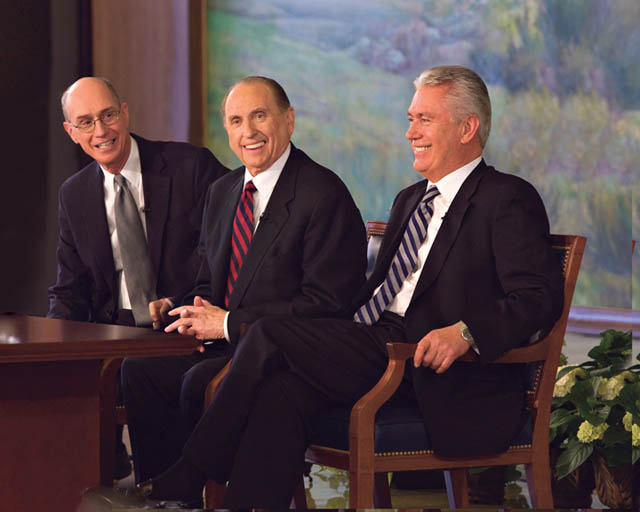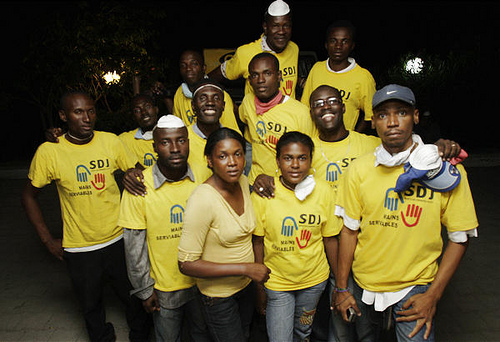 There are times when the Bible can seem confusing because it appears to give conflicting advice. One such situation concerns the topic of judgment. The Bible tells us we must not judge others unless we ourselves want to be judged, but it also offers a variety of situations in which we’re told to make judgments. What is a person supposed to do if he wants to obey all the commandments?
There are times when the Bible can seem confusing because it appears to give conflicting advice. One such situation concerns the topic of judgment. The Bible tells us we must not judge others unless we ourselves want to be judged, but it also offers a variety of situations in which we’re told to make judgments. What is a person supposed to do if he wants to obey all the commandments?
On March 1, 1998, Dallin H. Oaks spoke to college students at Brigham Young University on this topic. His talk is called, “”Judge Not” and Judging.” He is an apostle for The Church of Jesus Christ of Latter-day Saints, whose members are often called Mormons. His title within the Church is Elder Oaks. It is particularly interesting to note, given the topic of the talk, that prior to becoming a Mormon apostle, Elder Oaks was a judge, even serving on a state Supreme Court.
Elder Oaks explains the conflict is the result of having two types of judgment. The first is final judgment, which God does not allow us to make. This is the source of the commandment to avoid judging. The second is intermediate judgment. We can make this type of judgment, but we must make it righteously.
Final judgment refers to the judgment that occurs after we die and Jesus is judging us:
But why dost thou judge thy brother? or why dost thou set at nought thy brother? for we shall all stand before the judgment seat of Christ. (Romans 14:10)
Final judgment belongs to God and to Jesus Christ and will not be made until after our mortal lives are over. Even Jesus, during his time on earth, refused to make final judgments on people. Elder Oaks uses as an example the woman who was found guilty of adultery. The men were prepared to kill her, making final judgment on her. However, Christ protected her. He instructed her to stop sinning, but He did not pass judgment on her and said so. By allowing her to live, He gave her time to repent if she chose to do so.
And this is why we can’t make final judgment. We do not know how things will change in the future. It is very possible this woman did decide to repent. In addition, we don’t know the whole story. Elder Oaks explained:
“Thus, we must refrain from making final judgments on people because we lack the knowledge and the wisdom to do so. We would even apply the wrong standards. The world’s way is to judge competitively between winners and losers. The Lord’s way of final judgment will be to apply His perfect knowledge of the law a person has received and to judge on the basis of that person’s circumstances, motives, and actions throughout his or her entire life (see Luke 12:47–48; John 15:22; 2 Ne. 9:25).”
This means it is not up to us to decide if someone can be forgiven by God or not or to make comments about how God will handle their judgment. This is only God’s responsibility. However, there are times when we can and even should make decisions about people. These are intermediate decisions and concern only a specific situation. Jesus did make these types of judgments during His mortal life, setting the example for us. One example Elder Oaks uses is found in Matthew 7: 15-16:
15 Beware of false prophets, which come to you in sheep’s clothing, but inwardly they are ravening wolves.
16 Ye shall know them by their fruits. Do men gather grapes of thorns, or figs of thistles?
Obviously, to decide whether or not someone is actually a prophet, we are going to have to evaluate and judge them, but we are judging only that, and not whether or not they will be “saved.” That is God’s job, not ours. Our temporal judgment, however, must be done in righteousness, for the right reasons and with honest research and prayer.
Another situation Elder Oaks uses to demonstrate appropriate judgment is when a man is charged with abusing a child. Even if he is free on bail while awaiting trial, we have to make a certain level of judgment and keep our children from him—not because we know he is guilty but because we must protect our children. We also make certain levels of judgment in choosing our friends. A teen might say, “I am not comfortable with the places they go to have fun, so I am not going to choose them for friends.”
However, Elder Oaks cautions us that these intermediate judgments must be done righteously and in the proper way. He offers seven guidelines for making sure we are judging others appropriately.
1. The judgment must be intermediate and not offer opinions on the person’s final judgment.
2. “…a righteous judgment will be guided by the Spirit of the Lord, not by anger, revenge, jealousy, or self-interest.” We need to evaluate in a spirit of love and be guided by the gospel.
3. Judgment must be within our stewardship. We have no right to judge someone unless there is a real reason for us to do so. If I work with the children at church, I can make a judgment that impacts that responsibility, but it is not my responsibility to judge the leader of the women’s program. I don’t know what is going on behind the scenes there and I have no reason to make a judgment.
4. We must withhold judgment until we have all the facts, if at all possible. Frequently, we don’t have them and so our judgment is unfair. And of course, we must make sure that what we know is accurate. It isn’t a fact unless we’re sure it’s true. Elder Oaks reminds us to research and understand both sides of the story: “Someone has said that you cannot slice cheese so fine that it doesn’t have two sides.”
5. We must not judge people, only situations, except in certain emergency situations, such as the case mentioned earlier of a person accused of child abuse.
6. Forgiveness is part of judgment.
7. We must apply righteous standards to our judgments.
These principles apply to every aspect of our lives. Every day we are confronted with opportunities to pass judgment. Since we will be judged by the same standard we use on others, it is in our best interest to make sure we follow God’s guidelines in judging other people. As we study the example set for us by Jesus Christ, Himself, we can better understand the types of relationships we should have with others and how we should look at others, whether they are personal friends, leaders, or public figures. Christian behavior is not just a Sunday thing…it is every day in every part of our lives.
Watch a fascinating video about what one woman learned about judging others and about how we treat others.
The late Terrie Lynn Bittner—beloved wife, mother, grandmother, and friend—was the author of two homeschooling books and numerous articles, including several that appeared in Latter-day Saint magazines. She became a member of the Church at the age of 17 and began sharing her faith online in 1992.





